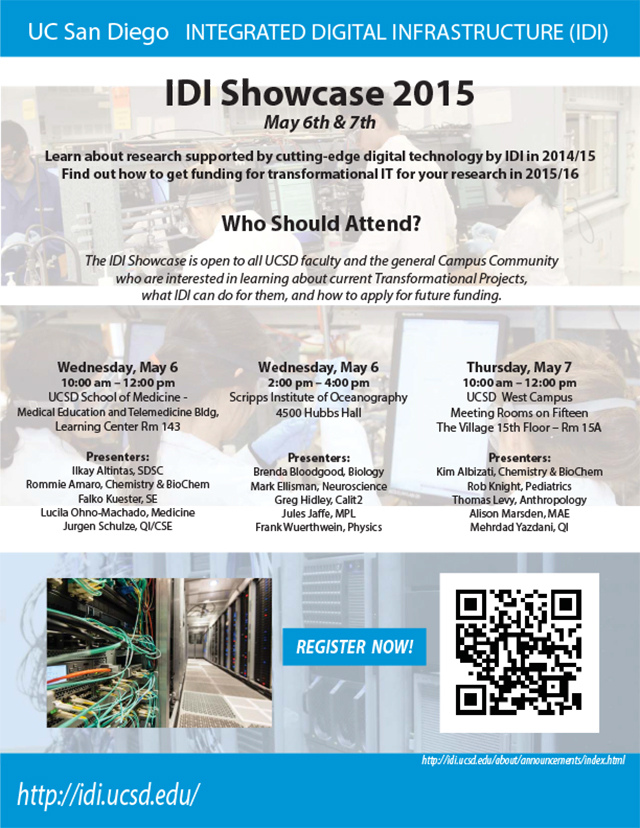In Three Showcase IDI Events, Faculty Will Share Experience of ‘Transformational Projects’
April 30, 2015 / By Paul K. Mueller

San Diego, Calif., April 28, 2015 — UC San Diego faculty members will report on the first “Transformational Projects” completed with the help of the year-old Integrated Digital Infrastructure (IDI) program in three showcase events on May 6 and 7, and the campus community is invited to attend.
“This will be a real celebration of a wide range of pioneering projects,” said IDI Director Larry Smarr, also founding director of the California Institute for Telecommunications and Information Technology (Calit2). “We hope the entire campus community will attend these inaugural Showcases to learn how IDI can help lead them to similar successes.”
Among its many responses to the challenges of the next century, the Campus Strategic Plan includes applying advanced information-technology services to support the wide variety of disciplines that increasingly depend on digital data. The IDI was conceived a year ago to provide a campus-wide approach to this vision, coordinating with the Library, SDSC, Qualcomm Institute, ACT, ACMS, and IT professionals in the schools to develop leading-edge integrated solutions that meet the needs of faculty, staff, and students.
To help mark the program’s inaugural year of service, the IDI will showcase some of the 18 Transformational Projects that IDI has helped enable. The leaders of these early experiments will share how they interacted with IDI to enhance the cyberinfrastructure that supports their research or instruction. In addition to viewing those success stories, attendees will learn how to apply for next year’s support for their own Transformational Projects.

Showcase dates, locations and speakers are:
Wednesday, May 6, 10 a.m. to noon, in the School of Medicine’s Education and Telemedicine (MET) Building, Learning Center Room 143.
- Ilkay Altintas: WiFire UCSD GIS effort
- Jurgen Schulze and Trey Ideker: Creating greatly expanded, scalable visualization capability for graphing gene and cellular networks
- Rommie Amaro: Rational drug design
- Falko Kuester: Prototype lab for student access to drones
- Lucila Ohno-Machado: Establish scalable Health Sciences HIPAA cloud for human-generated data
Wednesday, May 6, 2-4 p.m., at Scripps Institution of Oceanography, 4500 Hubbs Hall.
- Frank Wuerthwein: Large Hadron Collider/CMS Data Tier Two site
- Brenda Bloodgood: Neuronal computation changes in response to interactions with the environment
- Greg Hidley: SDSC's High Performance Wireless Research and Education Network
- Jules Jaffe: Underwater imaging of plankton/phytoplankton
- Mark Ellisman: Crack the living cell nucleus
Thursday, May 7, 10 a.m. to noon, at the Village at Torrey Pines, meeting rooms on 15.
- Kim Albizati: Undergraduate instruction in upper-division Chemistry
- Thomas Levy: Evolution of societies in the southern Levant from the Neolithic to Islamic periods
- Mehrdad Yazdani: Twitter Big Data study measuring happiness of metropolitan areas
- Allison Marsden: Graduate instruction on computational fluid dynamics
- Rob Knight: Radically advance UCSD's capabilities in multi-omic integration of the human microbiome
At each event, faculty speakers will describe their research and how IDI supported that work. Registration information, the full agenda for speakers and location maps are available at IDI’s website. Speakers affilited with Calit2's Qualcomm Institute include staffers Jurgen Schulze, Greg Hidley and Mehrdad Yazdani, as well as academic participants including Ilkay Altintas (SDSC), Falko Kuester (Structural Engineering and CISA3), Lucila Ohno-Machado (Medicine), Mark Ellisman (Neurosciences), Jules Jaffe (Scripps Institution of Oceanography), Thomas Levy (Anthropology and Archaeology), and Rob Knight (Pediatrics and CSE).
IDI co-program managers Valerie Polichar and Thomas DeFanti (DeFanti is affiliated with the California Institute for Telecommunications and Information Technology or Calit2), note that the Showcase projects demonstrate how advanced IT tools can transform research and instructional activities. IDI, they say, provides a host of valuable resources for faculty members, researchers, and students, including:
- A “concierge service” to guide you to the right services for your research and instructional needs.
- Support of advanced infrastructure, such as the SDSC colocation facility and the Triton Shared Computing Cluster, to maintain availability and ensure moderate pricing of basic services.
- A new Library facility for preserving and sharing curated UC San Diego digital data sets.
- Opportunity funds for transformational projects and digital research platforms that employ new digital technology in the research lab and in the classroom.
Related Links
Integrated Digital Infrastructure
Media Contacts
Paul K. Mueller, 858-534-8564, pkmueller@ucsd.edu
Tiffany Fox, (858) 246-0353, tfox@ucsd.edu

